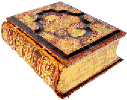A proper understanding of the planets, and indeed of the Universe itself, is only to be obtained by a knowledge of the doctrine of correspondences between the microcosm and the macrocosm.
God made the Universe from nothing, and therefore, as the Pantheists say, He is in all. But this is only part of the truth; for also He made all, and remains immune from His creation. Into these high mystical truths it is no part of our purpose here to enter. Suffice it to say that the Universe is to be regarded as a copy of God, a shadow of God, or even an incarnation or materialisation of God. Man likewise is made in His image. To recover the substance from the shadow is the task of the Adept; to compare the lesser image with the greater is the task of the astrologer.
Even at the outset of this study, certain salient analogies leap to the eye. In particular, we see in the planets the seven ages of man.
First, the Moon, changeable, passive, easily moulded, gentle, pure, dreamy – the child.
Next, Mercury, the youth at puberty, no longer changeable, but swiftly flashing, keen to know, self-conscious, often full of tricks and conceits.
Then, Venus, full of grace, tender, the new consciousness again become passive to absorb impressions from the world about it, eager to find a mate, devoted to art or religion.
Now comes the Sun, the adult, still agile, but steadier, active, brilliant and creative, the young man rejoicing in his strength.
Mars follows. The man becomes less occupied with self, plunges vigorously into the turmoil of life.
Jupiter symbolises his development from his strife into victory and rule. He is the head of his business, the father of a family.
Lastly comes Saturn, austere, grave, heavy, the hand of age upon his shoulder, and so, the end.
What then of Uranus and Neptune? These planets represent parts of man which are beyond time, or at least beyond the pretty cycles which we usually mean by time. It is not often enough that we consider the disproportion of human and astronomical time. The distances of the fixed stars, are so great that we seem to see a different order of being. In point of fact, the starry universe is just about 10,000,000,000,000,000,000,000 times as big as ours; and, curiously enough, our universe is just that much bigger than the universe of bacteria. Here are then three scales of creation, and only three, appreciable by us at present; this thought should serve to simplify our understanding.
Now, Uranus and Neptune represent those parts of ourselves which apprehend these vaster mirrors of the All-One. Fix this in the mind, and almost all their peculiarities will be explained.
Uranus is an exceedingly occult planet. Dark and dreadful, he is the Klingsor of Parsifal. He moves mysteriously in strange paths; he wears a mask of terror. He is infinitely slow, and yet infinitely sudden, like a snake. He represents the true magical power in man, capable of nameless evil, yet vital and necessary to his being; moreover capable of redemption and, when redeemed, the greatest power possible for good.
Of course, in beings of small development, these great powers do not exist. Uranus is for them merely the cause of eccentricity, or folly; if well-placed and aspected, the cause of scientific ardour, philant hropy, and the like.
Neptune is altogether the complement of Uranus. He is the outpost of the Solar system, and receives the influences of the stars. Here, he is the vice-regent of Nuit, the Star Goddess. For this reason he represents the eternal, just as the Sun does; but he is the circumference, while the sun is the centre, the Mother, and the Sun the Father.
He is thus remote, lonely, lost in dreams and aspirations of holiness ; brooding upon cosmic things, wooing the stars like Pierrot singing to the Moon. And so, in lesser natures, he brings masquerade, comedy, a trickiness and sprightliness which have a core of sorrow. And often, too, when aspiration goes astray, drugs and drinks are invoked to cure the melancholy, the void, the ache for the infinite – for all men do not understand that only He who struck off the soul, scattering it as a spark of His own fire, can satisfy its cravings.
This is a very significant point, Uranus also causes drug habits and alcoholism, but in this case it is a vice, a bestiality; with Neptune it is virtue strayed, a spirituality thwarted.
These remarks have been diffuse and incoherent beyond excuse. But they will have served their turn if they have exhibited a point of view, a method of study. Without that attitude and that gesture no man may come to a comprehension of the cosmos.
 AstroLibrary 🔎
AstroLibrary 🔎